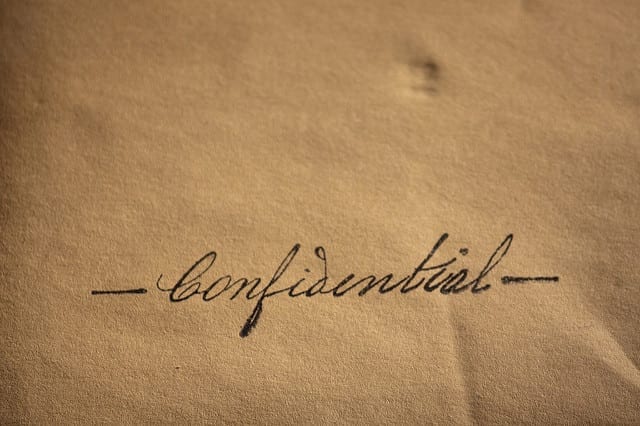 Before two businesses engage in discussions about a potential business relationship, they often start by signing a non-disclosure agreement, or NDA. Many companies have an approved NDA form that their employees are instructed to use. Not all NDAs are created equally, though, and some may be more favorable to one party over the other. Here are some things to look out for in an NDA, particularly if a party you are thinking about doing business with sends you their NDA form to sign, and you will be disclosing sensitive confidential information to them as part of your discussions:
Before two businesses engage in discussions about a potential business relationship, they often start by signing a non-disclosure agreement, or NDA. Many companies have an approved NDA form that their employees are instructed to use. Not all NDAs are created equally, though, and some may be more favorable to one party over the other. Here are some things to look out for in an NDA, particularly if a party you are thinking about doing business with sends you their NDA form to sign, and you will be disclosing sensitive confidential information to them as part of your discussions:
- Confirm the NDA is a mutual one. Many companies use a form that protects only their information. If you receive an NDA that is not mutual, ask the person who sent it to you if they have a form that is mutual. You should insist on an NDA that protects you as well.
- Read closely the definition of “confidential information” (or whatever term or clause the NDA uses to refer to the information that is actually protected by the NDA). Sometimes the NDA’s protections are limited to information that is in writing or other tangible form and that is actually labeled or otherwise affirmatively identified as being confidential or proprietary. You may not want the definition to be so narrow, because anything that doesn’t fit in the definition isn’t protected by the NDA. The ideal definition depends on the nature of the information you will be disclosing and the manner of disclosure, but be sure what you do disclose and the manner you disclose it will result in the NDA’s protections applying.
- Be on the look out for clauses that impose restrictions unrelated to confidentiality. Examples of this include a non-solicitation clause or more rarely a flat non-compete, which some companies include in their form NDAs. When present, by signing the NDA you may be agreeing not to solicit or hire the other party’s employees or approach their customers or otherwise compete with them. In my experience, it is premature to agree to these types of restrictions at the NDA stage.
- Some NDAs will include what is called a “residuals” clause. These are rarer, but you should understand what they do in case you see an NDA with one. The idea of a residuals clause is that the NDA will not prohibit a party’s personnel from utilizing general ideas that they might retain in their unaided memory after having been exposed to an idea by having reviewed the other party’s confidential information. A residuals clause can effectively undo the protection of the NDA with some types of information. So you should be wary of relying on any NDA for protection that includes a residuals clause.
- An NDA will prohibit any unauthorized disclosure of the other party’s confidential information, typically subject to a few exceptions. One common exception is where some disclosure is required by law (e.g., if the information is subpoenaed). In such cases you should ask to be afforded the courtesy of being given prior notice of any such disclosure (unless also prohibited by law) so that you may take steps to intervene (and maybe seek to quash the subpoena or seek confidential treatment of the information if disclosed).
- Some NDAs will provide that the fact the parties are even talking to one another should be treated as confidential. In those situations, you should refrain from disclosing that you have entered into an NDA or are even in negotiations with the other party (i.e., the first rule of this NDA is we don’t talk about this NDA).
- NDAs may have time limits that provide that they no longer apply after some fixed period. Time limits in an NDA are somewhat common but in my opinion are inappropriate by and large. Most parties would, I think, expect their confidential information to be protected for as long as it remains confidential to them. Imagine, for example, if your business relied on knowing the recipe for a world-famous beverage that has been around for 100+ years and you needed to share part of that recipe with a party who might be manufacturing one of the recipe components. It wouldn’t make much sense if the NDA you signed only lasted for two years. NDAs should, in most cases, not provide for a time limit, and should instead provide that at the end of negotiations or the business deal any confidential information should be returned or destroyed.
If you are past the NDA stage and are negotiating a contract for a relationship where you will be exchanging sensitive information (as is often the case), be sure the contract includes a confidentiality clause, and give thought to the above list (which applies to such clauses in much the same way as it does to NDAs). You want to make sure the confidentiality clause fairly protects you and does not include any provisions that might unduly restrict your business or put your confidential or proprietary information at risk.
*Photo Credit: Photo by skepticalview on Foter.com / CC BY-NC-ND
*NOTE: This is one of a series of blog entries on the subject of contracts directed principally at small business owners. The primary purpose of this blog is to identify areas of concern in typical contracts so that small business owners can be on the lookout for issues that may adversely affect them. However, this series is not intended as a replacement for obtaining the advice of a good contracts or business attorney, ideally before signing a contract. Every situation is unique, and the preceding is very general advice and is not intended nor should it be received as legal advice or creating an attorney-client relationship between the reader and Klein Bussell, PLLC.
**Klein Bussell attorneys do not blog about pending matters handled on behalf of our clients and will never disclose client confidences.
The information contained in this blog does not constitute legal advice, nor does this blog create an attorney-client relationship. KSM attorneys do not blog about pending matters handled on behalf of our clients and will never disclose client confidences.





